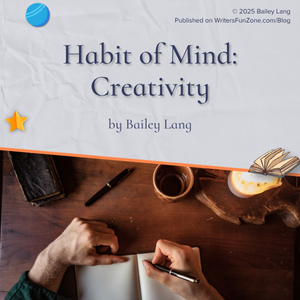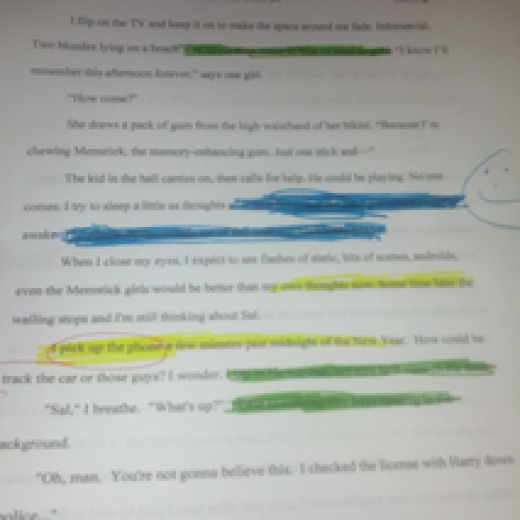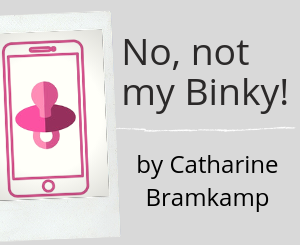Habit of Mind: Creativity by Bailey Lang
 Let’s welcome back Bailey Lang as she shares with us “Habit of Mind: Creativity.” Enjoy!
Let’s welcome back Bailey Lang as she shares with us “Habit of Mind: Creativity.” Enjoy!
***
How you think affects how you behave — and if you’re someone who wants to write, paying attention to your habits of mind is as important as trying to adjust your external habits to get more words on the page.
In this article series, we’ve already talked about curiosity, openness, and engagement.
Today, we tackle a big one: creativity.
What is Creativity?
You might be thinking that a whole article about creativity is a waste of time.
You’re a writer.
Obviously you’re creative, right?
You’ve got that in the bag, unless you’re feeling blocked, burned out, exhausted, overly busy, distracted by your phone, or — the list goes on.
The thing is, creativity isn’t just about putting something beautiful, expressive, or unique on the page.
As a habit of mind, creativity encourages us to change our orientation to everything.
According to the framework that forms the foundation of this series, creativity is “the ability to use novel approaches for generating, investigating, and representing ideas.”
Creativity is more than your ability to come up with a new type of dragon for your epic fantasy trilogy.
It’s about how comfortable you are taking risks, trying new approaches in your practice, exploring new methods of engaging in writing, and, crucially, assessing how it all went at the end of the process.
How do Writers Practice Creativity?
As writers, we practice being creative every time we sit down to write — no real surprise there!
However, we can always cultivate more opportunities for creative thinking.
Imbuing your everyday habits of mind with creativity will pay dividends in your writing practice.
You can grow your sense of creativity by providing yourself with opportunities to get curious.
- What’s something you’ve always wanted to know or do?
- How can you learn more or get engaged?
Going beyond our first impulses (“I’ll Google it” or “I’ll watch a YouTube video of an expert”) forces us to get more creative about how we discover new ideas.
The more we’re learning, the more likely we are to draw interesting connections between seemingly unrelated things — and odds are good you’ll come up with something cool to use in your writing.
We can also ramp up our creativity by assessing where we’ve fallen into a rut in our creative practice.
Maybe you always write stories from a particular point of view, and you challenge yourself to write a handful of stories using an unfamiliar perspective.
Paying attention to where our writing feels comfortable, familiar, or even stale can point us to places where an injection of creativity might breathe new life into our work.
Creative Activities for Writers
Increasing your creativity doesn’t have to be about coming up with the wackiest, most unrealistic scenario possible for a story (although that can be a lot of fun!).
Making creativity into a habit of mind is about creating the conditions where you feel excited and encouraged to regularly try new things, test out ideas, and see what happens.
Introduce a Constraint
We often assume creativity happens when we remove as many obstacles as we can between us and our writing — but constraints are incredibly useful tools for forcing us to get creative.
By blocking off possibilities, we pay closer attention to the resources we have, and we get a lot more creative about how we use them.
Here are some constraints you could play with to increase your creativity (in your writing and your thinking more broadly):
- Compose a poem without using the letter “e”
- Write a scene that only refers to one sensory detail (i.e., sight, sound, smell, taste, or touch)
- Create a new recipe using only food you already have
- Come up with 20 non-standard uses for a simple object — a brick, a pen, a book
Go Outside as Often as Possible
There’s a significant amount of research showing that getting outside enhances our creativity.
Getting off our devices and out into the world — even a small park in a busy city — can help us restore our attention, leading to more creative thinking and problem-solving capabilities.
The more time you spend outside, the more likely you are to have the kind of creative breakthrough that feels like a gift from your Muse.
Build intentional outdoor rambling (sans cell phone) into your daily and weekly rhythms, and pay attention to your attention, your creativity, and your overall mood!
Reading Recommendations
- How Nature Can Make You Kinder, Happier, and More Creative
- 3 Science-Based Strategies to Increase Your Creativity
- Find Your Unicorn Space (affiliate link)
- Big Magic (affiliate link)
***
About the Author
 Dr. Bailey Lang is a book coach, writer, and editor.
Dr. Bailey Lang is a book coach, writer, and editor.
At The Writing Desk, she helps authors build sustainable, enjoyable writing practices that take their books from draft to done.
Bailey has a PhD in rhetoric and writing studies and loves geeking out about writing.
You can sign up for Bailey’s free newsletter, Word to the Wise, for more writing advice and regular author interviews.






